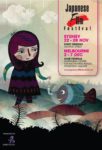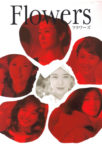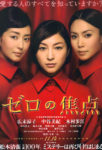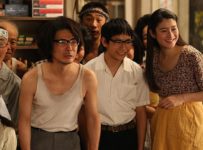 It has been half a week since the end of the Sydney leg of 14th Japanese Film Festival, and we’re slowly coming down off the dizzying heights of the best that Japanese cinema has to offer us. Is Post Festival Displacement (PFD) a treatable disorder, and if so, can we claim it on Medicare? With sleep patterns more or less back to normal, and all of my individual reviews now completed, I thought it would be a good chance to go back and review the week that was and pick my top 5 or so films. Having managed to catch 18 out of the whopping 22 films on offer, every single one of which is reviewed on this blog, what better way to wrap up than highlight some of the audience and my personal favourites from the festival?
It has been half a week since the end of the Sydney leg of 14th Japanese Film Festival, and we’re slowly coming down off the dizzying heights of the best that Japanese cinema has to offer us. Is Post Festival Displacement (PFD) a treatable disorder, and if so, can we claim it on Medicare? With sleep patterns more or less back to normal, and all of my individual reviews now completed, I thought it would be a good chance to go back and review the week that was and pick my top 5 or so films. Having managed to catch 18 out of the whopping 22 films on offer, every single one of which is reviewed on this blog, what better way to wrap up than highlight some of the audience and my personal favourites from the festival?
Now in its 14th year, the festival has grown from 5 films and 500 guests to a reported 7,700 people in 2010 and sold out sessions such as Hanamizuki, Confessions, Shodo Girls and The Summit. The real joy of a Festival, of course, is discovering films that you wouldn’t otherwise see in mainstream or even smaller cinemas throughout the year. Indeed, thousands of films go unreleased in Australia every year, with festivals such as these the primary and sometimes only way for Australian audiences to enjoy the best foreign language films from around the world. Previous film festivals have given us our first looks at films such as the Oscar-winning Departures, ALWAYS – Sunset on Third Street, Still Walking, Memories of Matsuko, Kamui and Kabei – Our Mother.
The selection of films this year was about as diverse as one could get, from the sports film and audience favourite Feel the Wind to the closing night medical drama A Lone Scalpel. Long gone are the days when Japanese cinema could simply be classified as jidai-geki (or period dramas) or gendai-geki (contemporary dramas). Each of the films on the menu revealed a little bit more about Japanese culture and the Japanese state of mind, and each was as different from the last. The ghost of Yasujiro Ozu hung over many of the films this year, with young and contemporary filmmakers seemingly eschewing the fast-paced US influences that the entire exploitation genre appears to have aped, and choosing a more studied and measured pace. This was definitely true of the aptly name Kyoto Story, but could also be found in diverse selections like the samurai Sword of Desperation and Villon’s Wife.
Yet it would be a mistake to think that contemporary Japanese filmmakers are merely rehashing the past. Although there may be elements of the masters in all of these works, these films all offer ways of storytelling that only the cinema can offer. So without any further ado, which ones were my favourites? After a little bit of list reshuffling, my Top 5 films for the 14th Japanese Film Festival are:
 It was a difficult decision, especially between the top two films, but FLOWERS just bowled me over from the first frame. Employing some of the finest actresses working in Japan today, the film is for lovers of cinema of all eras, and there is a great deal to be found in this wonderful piece that spans over 70 years of Japanese, and in turn, Japanese cinema history. Confessions, Japan’s official entry for the best foreign film category at the Academy Awards, is brutal and confronting but impossible to ignore. Definitely a tale on equal footing with Park Chan-wook’s Oldboy. Solanin made me cry (repeatedly), and was one of the must-see entries at this year’s festival for anybody who puts all of their energy into merely existing. Sword of Desperation was a genuine surprise: a samurai film with Ozu sensibilities and a spectacularly bloody finale. It will no doubt have a second life on DVD and Blu-ray. Last, but definitely not least, was Oblivion Island: Haruka and the Magic Mirror. Production I.G.’s first feature with their 3DCG unit fills that wonderful void betweenToy Story, Alice in Wonderland/Spirited Away and The Wombles, but still feels fresh and original. You can visit the links above for full reviews of each of the films.
It was a difficult decision, especially between the top two films, but FLOWERS just bowled me over from the first frame. Employing some of the finest actresses working in Japan today, the film is for lovers of cinema of all eras, and there is a great deal to be found in this wonderful piece that spans over 70 years of Japanese, and in turn, Japanese cinema history. Confessions, Japan’s official entry for the best foreign film category at the Academy Awards, is brutal and confronting but impossible to ignore. Definitely a tale on equal footing with Park Chan-wook’s Oldboy. Solanin made me cry (repeatedly), and was one of the must-see entries at this year’s festival for anybody who puts all of their energy into merely existing. Sword of Desperation was a genuine surprise: a samurai film with Ozu sensibilities and a spectacularly bloody finale. It will no doubt have a second life on DVD and Blu-ray. Last, but definitely not least, was Oblivion Island: Haruka and the Magic Mirror. Production I.G.’s first feature with their 3DCG unit fills that wonderful void betweenToy Story, Alice in Wonderland/Spirited Away and The Wombles, but still feels fresh and original. You can visit the links above for full reviews of each of the films.
Picking the top five is like picking your favourite breath of air at times, and there are always going to be a few excellent films that miss out on the top cut. Everybody I know seemed to love Feel the Wind, although I couldn’t help but think that we’d seen this kind of sports movie before (and we saw it again by the end of the Festival, with Box!). Yet it is an audience favourite and worth a mention here on that account. The Summit: A Chronicle of Stones was also an amazing achievement in Japanese cinema, a mountain-climbing epic shot over 200 days on location with no special effects. If for no other reason, one should seek this out (on the biggest screen possible) for the breathtaking cinematography. Flavor of Happiness , Dear Doctor and Kyoto Story were all films that I certainly enjoyed at the time of watching them, but the quality of the Top 5 certainly eclipsed them. Each one certain deserves a wider release though.
 Naturally, there were a few disappointments in the list. For all the promise of “Hitchcock meets Charlie’s Angels“, Zero Focus was an exercise in style over substance, and needlessly complicates what is otherwise a simple tale of murder and intrigue. Likewise, despite making virtually every Japanese Top 10 list for 2009, Villon’s Wife is a slow-moving tale that keeps the audience at arm’s length for much of the distant narrative, with a titular lead that often behaves incomprehensibly. However, these were minor blips in what was otherwise a strong and diverse selection of Japanese film. On a semi-related note of disappointments, due to scheduling clashes, this was the first year that audiences have not been able to see all of the films on the bill, especially in the case of the Anime Masturi films. A real shame for audiences was having choose between the panel discussion and student film screening with Kyoto Story and FLOWERS, which may have split the audience and disappointed some. I personally regretted missing out on Castle Under Fiery Skies, Time of Eve/Precious double-bill and the student film, Wish You Were Here. As the Japanese Film Festival gets bigger every year, this seem inevitable.
Naturally, there were a few disappointments in the list. For all the promise of “Hitchcock meets Charlie’s Angels“, Zero Focus was an exercise in style over substance, and needlessly complicates what is otherwise a simple tale of murder and intrigue. Likewise, despite making virtually every Japanese Top 10 list for 2009, Villon’s Wife is a slow-moving tale that keeps the audience at arm’s length for much of the distant narrative, with a titular lead that often behaves incomprehensibly. However, these were minor blips in what was otherwise a strong and diverse selection of Japanese film. On a semi-related note of disappointments, due to scheduling clashes, this was the first year that audiences have not been able to see all of the films on the bill, especially in the case of the Anime Masturi films. A real shame for audiences was having choose between the panel discussion and student film screening with Kyoto Story and FLOWERS, which may have split the audience and disappointed some. I personally regretted missing out on Castle Under Fiery Skies, Time of Eve/Precious double-bill and the student film, Wish You Were Here. As the Japanese Film Festival gets bigger every year, this seem inevitable.
What festivals such as this continue to highlight is their own importance in bringing world cinema to our screens. Although the festival circuit is increasingly crowded – it sometimes seems that not a week goes by without some genre or country specific festival running – these may be the only time Australians get to see foreign language films in cinemas. If you are as passionate about world cinema as we are, contact the local distributors and let them know that you are interested in seeing these films Down Under. Better yet, vote with your wallet: buy your foreign films from distributors like Madman, Hopscotch, Dendy, Umbrella and similar local purveyors of fine foreign language films, rather than importing from Amazon. Send a clear message that ‘Australians love seeing a good film’, regardless of where it is from.
This concludes our coverage of the always excellent 14th Japanese Film Festival. At the time of writing, the Melbourne run of the Festival is now on, so hopefully this will help you navigate through some of the excellent choices this year. We’d like to thank the organisers of the 14th Japanese Film Festival for providing us with press access, screeners, invites to contribute to their blog and a damn fine festival generally. Here’s looking forward to the 15th anniversary of the Japanese Film Festival in 2011, and you can count on The Reel Bits being at as many sessions as possible!
For complete reviews for all 18 films seen, please visit our Japanese Film Festival category.
DVDBits can be found on Twitter @DVDBits. DVD Bits is at http://www.dvdbits.com.





Was wondering, during the festival was there any mention of the Japanese live action movie Space Battleship Yamato getting an Australian release??
Hi Paul,
Nothing was specifically mentioned about it, but I think ‘Space Battleship Yamato’ was only released on 1 December 2010 in Japan, and the JFF festival wrapped up (at least in Sydney), in late November. Fingers crossed for a release at JFF15 in late 2011!
Maybe you can lobby the Japanese Film Festival to give it a screening here? Sorry I couldn’t be of more help.
R
Thanks for the reply, Will just have to wait for the Hong Kong BD release 🙂